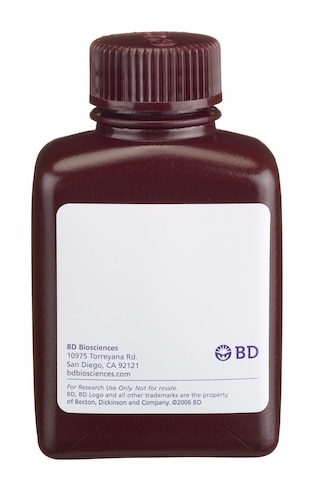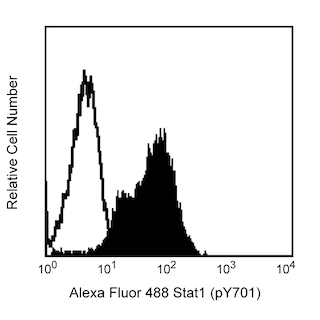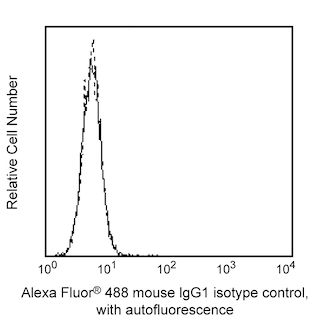-
Your selected country is
Middle East / Africa
- Change country/language
Old Browser
This page has been recently translated and is available in French now.
Looks like you're visiting us from {countryName}.
Would you like to stay on the current country site or be switched to your country?




.png)

Flow cytometric analysis of Sox17 in definitive endoderm derived from human embryonic stem (ES) cells. H9 human ES cells (WiCell, Madison, WI) grown on an irradiated mouse embryonic feeder layer were differentiated to definitive endoderm for 3 days (D'Amour et al, 2005) in RPMI medium supplemented with 0.5% FBS, 1× L-glutamine, and 100 ng/ml Activin A (R&D Systems). Control ES cells (left panel) and day-3 differentiated cells (right panel) were fixed with BD Cytofix™ Fixation Buffer (Cat. No. 554655) and permeabilized with BD Phosflow™ Perm Buffer III (Cat. No. 558050). The cells were stained with either Alexa Fluor® 488 Mouse IgG1, κ isotype control (dashed lines, Cat. No.557782) or Alexa Fluor® 488 Mouse Anti-Human Sox17 antibody (solid lines) at matched concentrations. The histograms were derived from gated events based on light scattering characteristics of the human ES and H9-derived endoderm cells, respectively. Flow cytometry was performed on a BD LSRFortessa™ flow cytometry system.

Immunofluorescent staining of Sox17 on definitive endoderm derived from human embryonic stem (ES) cells. H9 human ES cells (WiCell, Madison, WI) passage 33 grown on an irradiated mouse embryonic feeder layer were differentiated to definitive endoderm for 3 days in RPMI supplemented with 0.5% FBS, 1× L-glutamine, and 100 ng/ml Activin A (R&D Systems) (D'Amour et al, 2005). The cells were fixed with BD Cytofix™ Fixation Buffer (Cat. No. 554655), permeabilized with 0.1% Triton™-X 100, and stained with Alexa Fluor® 488 Mouse anti-Human Sox17 monoclonal antibody (pseudo-colored green). Counter-staining was with Hoechst 33342 (pseudo-colored blue). The image was captured on a BD Pathway™ 435 Cell Analyzer and merged using BD Attovision™ Software.
.png)

BD Pharmingen™ Alexa Fluor® 488 Mouse anti-Human Sox17

BD Pharmingen™ Alexa Fluor® 488 Mouse anti-Human Sox17
.png)
Regulatory Status Legend
Any use of products other than the permitted use without the express written authorization of Becton, Dickinson and Company is strictly prohibited.
Preparation And Storage
Product Notices
- This reagent has been pre-diluted for use at the recommended Volume per Test. We typically use 1 × 10^6 cells in a 100-µl experimental sample (a test).
- An isotype control should be used at the same concentration as the antibody of interest.
- Alexa Fluor® 488 fluorochrome emission is collected at the same instrument settings as for fluorescein isothiocyanate (FITC).
- For fluorochrome spectra and suitable instrument settings, please refer to our Multicolor Flow Cytometry web page at www.bdbiosciences.com/colors.
- The Alexa Fluor®, Pacific Blue™, and Cascade Blue® dye antibody conjugates in this product are sold under license from Molecular Probes, Inc. for research use only, excluding use in combination with microarrays, or as analyte specific reagents. The Alexa Fluor® dyes (except for Alexa Fluor® 430), Pacific Blue™ dye, and Cascade Blue® dye are covered by pending and issued patents.
- Caution: Sodium azide yields highly toxic hydrazoic acid under acidic conditions. Dilute azide compounds in running water before discarding to avoid accumulation of potentially explosive deposits in plumbing.
- Source of all serum proteins is from USDA inspected abattoirs located in the United States.
- Alexa Fluor® is a registered trademark of Molecular Probes, Inc., Eugene, OR.
- Triton is a trademark of the Dow Chemical Company.
- Please refer to www.bdbiosciences.com/us/s/resources for technical protocols.
Companion Products




The P7-969 monoclonal antibody reacts with human Sox17, a member of the SOX (SRY-releated HMG-box) family of transcription factors. SOX family members contain a DNA binding domain (HMG-box) and are involved in the control of development. Sox17 is expressed in primitive and definitive endoderm and regulates fetal and neonatal hematopoietic stem cell proliferation.
Development References (5)
-
D'Amour KA, Agulnick AD, Eliazer S, Kelly OG, Kroon E, Baetge EE. Efficient differentiation of human embryonic stem cells to definitive endoderm.. Nat Biotechnol. 2005; 23(12):1534-41. (Methodology). View Reference
-
Katoh M. Molecular cloning and characterization of human SOX17. Int J Mol Med. 2002; 9(2):153-157. (Biology). View Reference
-
Kim I, Saunders TL, Morrison SJ. Sox17 dependence distinguishes the transcriptional regulation of fetal from adult hematopoietic stem cells. Cell. 2007; 130(3):470-483. (Biology). View Reference
-
Serrano AG, Gandillet A, Pearson S, Lacaud G, Kouskoff V. Contrasting effects of Sox17- and Sox18-sustained expression at the onset of blood specification. Blood. 2010; 115(19):3895-3898. (Biology: Cell differentiation). View Reference
-
Séguin CA, Draper JS, Nagy A, Rossant J. Establishment of endoderm progenitors by SOX transcription factor expression in human embryonic stem cells. Cell Stem Cell. 2008; 3(2):182-185. (Biology). View Reference
Please refer to Support Documents for Quality Certificates
Global - Refer to manufacturer's instructions for use and related User Manuals and Technical data sheets before using this products as described
Comparisons, where applicable, are made against older BD Technology, manual methods or are general performance claims. Comparisons are not made against non-BD technologies, unless otherwise noted.
For Research Use Only. Not for use in diagnostic or therapeutic procedures.
Report a Site Issue
This form is intended to help us improve our website experience. For other support, please visit our Contact Us page.